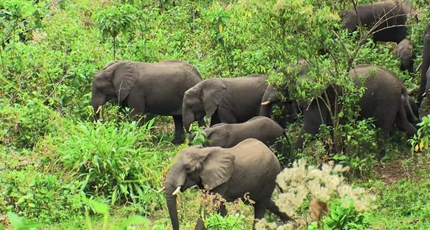
Elephants contribute significantly to the biological balance of their habitats and give several ecological, economic, and social advantages. As a result, elephants may help the environment by dispersing numerous seeds. They consume a broad range of plant species and help disseminate seeds across long distances through their droppings, helping forest regeneration and biodiversity.
They are also in favor of changing the environment. While they go across their habitats, elephants make paths and clearings that provide other species access to water supplies and fresh chances for plant development. Additionally, they can improve soil quality and encourage the growth of flora by aerating the soil through their movements and feeding habits. By offering important ecosystem services like carbon sequestration and water control, elephants’ presence in natural habitats supports the general health and functionality of these settings.
Due to their popularity as a wildlife attraction, which draws tourists to national parks and reserves and boosts local businesses and communities, elephants also benefit a nation’s economy. Besides, elephants are highly valued both culturally and spiritually in many nations, where they are frequently used as representations of power, conservation, and wisdom. They are also essential for economic prospects since local populations can profit from jobs created by conservation efforts aimed at safeguarding elephants, which can be found in ecotourism, wildlife management, and other related businesses.

Ethiopia is home to the African elephant, the biggest terrestrial mammal on the planet. The country contains various national parks and wildlife reserves where elephants may be found, including the Babile Elephant Sanctuary and the Omo National Park.
Haramaya University Biodiversity lecturer and expert Dr. Anteneh Belayneh told The Ethiopian Herald that the Ethiopian people are fond of elephants. It was stated that, unlike other concerns, the people who live by the habitats of elephants have share the same opinion about them. The reason for this is that villages follow the elephant to save their lives during times of drought because the elephant searches for areas with water and food.
Elephants can also indicate appropriate locations for semi-pastoralists in times of drought since they feel where water is found. They also associate their own existence with serenity. As a result, most people referred to elephants as peacemakers and ecological strategists, he added.
Despite the conservation efforts that are underway to protect these magnificent creatures and their natural habitats, the population of elephants, in some parts of the country, has been declining due to habitat loss and poaching. Taking this view into account, the government, especially following the political reform that took place in mid-2018, focused on protecting, preserving, and beautifying the natural resources of the country. The inauguration of Chebera Elephant Paw Lodge is a good example and indicator of harmonizing nurture, preservation, and entertainment.
Prime Minister Abiy Ahmed said “We will consolidate building a better Ethiopia by turning our blessings into tangible resources. Ethiopia is a country endowed with many blessings, and the Konta Zone where the lodge is found is a perfect display of natural wealth. We should strongly desire and understand three things to transform Ethiopia to a higher level; and those are seeing, acting, and maintaining prosperity”.
He explained that “the richness of vision is to look properly at what is in front of us and realize that there is a better opportunity in it. The premier said a person who is not lucky enough to see prosperity may consider the wealth next as debt. He also pointed out that if we cannot see the blessings given to us, others may see and take them away. Many have not been fortunate enough to see their wealth because of a lack of seeing their prosperity and their wealth has been taken and exploited by others. However, the ability to know the wealth around us alone does not bring results, he stated, adding that it is important to work hard for full utilization of the resources. Protecting and sustaining history is as important as showing kindness and hospitality to the Ethiopian people to tourists as well as giving protection to them.”
House of People’s Representative (HPR) Speaker, Tagesse Chafo stated that the Chebera Churchura Elephant Paw Lodge is a transformative example for Ethiopia’s development praising its ability to turn local tourism gems into national prosperity. Noting that Ethiopia is blessed with natural resources in all its corners, the speaker added that these resources have great potential to contribute to job creation, economic growth, and prosperity. Therefore, it is necessary to ensure mutual benefit by identifying and developing the national resources.
Miniser of Mines Engineer Habtamu Tegegn said that the newly inaugurated Chebera Churchura Elephant Paw Lodge has been built as a tourist attraction of international standards. The national park is home to the endangered African elephant species, buffalo, wild boar, deer, and antelope, among others. Several rivers also cross the densely forested park and it has five lakes.
Indeed, the Lodge is necessary not only to beautify and attract tourists but also to maintain and safeguard the elephants and biodiversity of the nation. It might also be an excellent model for the Babile elephant sanctuary. By coincidence, the elephant has found itself in the Babile Sanctuary, where it can travel no farther. Because it cannot travel down to the desert because there is a tremendous risk waiting for it, including the sand that hundred it. If it goes, it will end up in the Indian Ocean. It can’t travel to the front because the steep mountains of Eastern Hararge, particularly the Gara Mulleta, are in the way. Furthermore, agricultural settlers inhabit the Eastern Hararghe Mountains.
Unlike other elephants that live elsewhere, which can move and change their place the Babile Elephant has nowhere to go and its fate depends only on the Sanctuary. Therefore, the elephant is in a very critical situation and forced to live in an isolated ecosystem.
The sanctuary, on the other hand, has experienced significant man-made and environmental problems. Factors affecting the sanctuary include illegal settlements, land grabbing, agricultural development, unplanned investment, poaching, climate change, invasive migratory weeds, and recurrent drought.
Hence, the Chebera Churchura Elephant Paw Lodge provides hope for the Babile Elephants since the government’s attention wakes regional governments, the local community, and essential stakeholders to work together to rescue them by beautifying and making the area tourism destinations.
Especially, the completion of the Chebera Churchura Elephant Paw Lodge inspires the concerned bodies to make the sanctuary eastern part of Ethiopia a tourist destination by linking the historical city of Harar, Dakota stone, Lij Iyasu detention area, and Kundudo mountain with its horses. Saving the elephant helps to save rivers, the communities, and to fight climate change.
In general, elephants play a vital role in maintaining healthy ecosystems and contribute to the well-being of both natural environments and human societies. The Chebera Churchura Elephant Paw Lodge can set a good example for protecting and conserving elephant populations across the country. This is, in turn, essential for ensuring the ecological, economic, and social benefits to sustained for future generations.
BY EPHREM ANDARGACHEW
THE ETHIOPIAN HERALD WEDNESDAY 27 DECEMBER 2023




